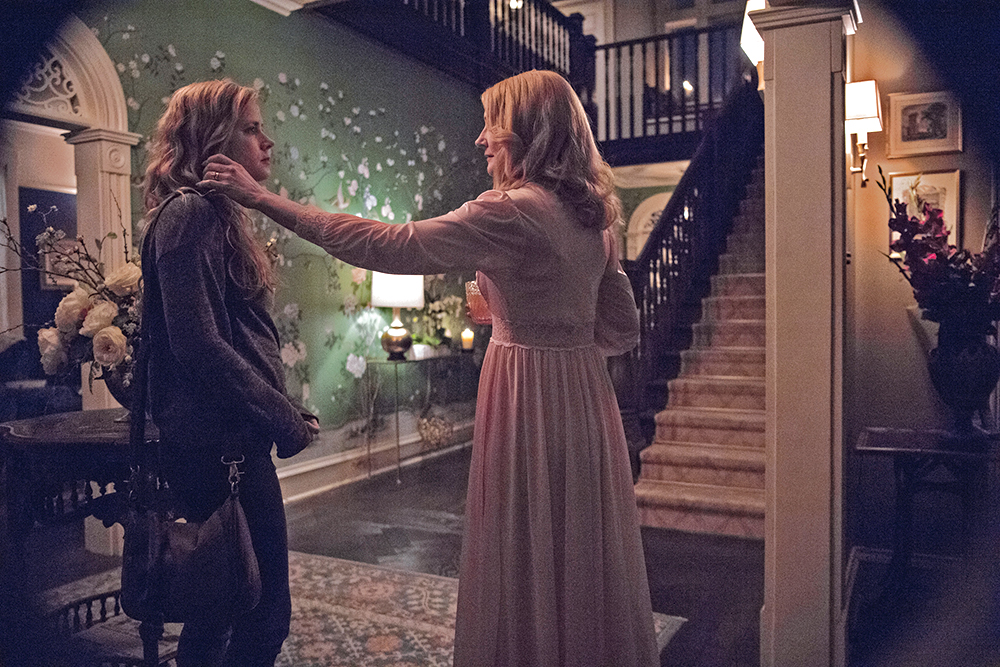Inside Jason Blum’s Plan to Take TV by Storm
By Brent Lang
LOS ANGELES (Variety.com) – Jason Blum has made a fortune creeping out movie audiences with low-budget horror hits like “Paranormal Activity,” “The Purge” and most recently “Get Out,” the kind of zeitgeisty smash that comes along once a decade or so. Now, one of Hollywood’s most revolutionary producers is bringing a different kind of scary to the small screen.
Moving into television is enabling Blum to broaden his palette beyond the blood-and-gore-spattered stories that established his reputation. These days, he’s tackling an even darker subject — politics.
For Blum, nothing is more terrifying than the news out of Washington and the conservative media that has enabled Trump’s rise. “Roger Ailes scares me,” says Blum. “Steve Bannon scares me.”
In fact, Blum has limited series coming up on both controversial public figures: One, based on Gabriel Sherman’s book “The Loudest Voice in the Room,” about the fallen Fox News chief, will air on Showtime, and the other will be adapted from Joshua Green’s “Devil’s Bargain,” an insider account of Bannon and Donald Trump’s fraught political alliance. Also in the works are two true-crime series, one at FX and the other at Oxygen; an adaptation of James McBride’s “The Good Lord Bird” with Ethan Hawke; and a small-screen version of his movie franchise “The Purge” that will debut on USA and Syfy in September.
Only about 20% of the TV shows Blum has on tap would be considered pure horror; the bulk of what he’s backing will be darkly themed stories involving media, true crime or Beltway boogeymen.
“It’s not just about the monster under the bed but also the things that keep us up at night,” says Marci Wiseman, co-president of Blumhouse TV.
It’s a critical moment for Blum and his rapidly expanding television business. The first show to be released under the initiative, “Sharp Objects,” premieres July 8 on HBO. Originally conceived as a feature film, it was retrofitted as a prestige small-screen drama. Now HBO believes the series, which stars Amy Adams as a journalist who returns to her Southern hometown to investigate a murder, could be a “Big Little Lies”-size breakout. Jean-Marc Vallée, the director of that miniseries, also oversaw “.”
“My hair stood up each time I watched an episode,” says HBO chief executive Richard Plepler. “It ranks up there with some of the finest things we’ve ever done.”
Blum’s robust lineup of shows marks the next evolution in the producer’s business plans. Having conquered the movie world, he now wants to dominate the television arena.
“There was no way to continue the mission of the company and not be in TV,” he says. “The growth in the content business is in television. It’s not in movies.”
To finance his grand ambitions, Blum sold a $40 million stake in TV to ITV Studios, the U.K. production company. He funneled that money back into the company, using it to finance a development slate that has paid off with eight series pickups.
With boyish good looks that belie his 49 years, a mischievous smile and a habit of calling everyone “buddy,” Blum doesn’t look the part of a horror-movie maestro. His home is light and airy. It’s not crypt-like — there’s no altar to Vincent Price or “Dracula” posters above the fireplace, just a few family photos and a set of barbells resting on the porch. On a bright May afternoon, Blum, armed with a box of tissues to ward off allergy season and outfitted in a gray T-shirt and running shorts, looks more like a suburban dad than the man who has terrified audiences with stories of poltergeists and body snatchers.
“If you look at the kinds of movies he makes, you might imagine him to be dark and twisted,” says Donna Langley, chairman of Universal Pictures, the studio where Blumhouse has a 10-year first-look film deal. “But he’s not. He’s an enthusiast with the kindest heart. It’s incongruous.”
Blum, who has Langley and every other studio chief and high-powered talent agent on speed dial, can get a meeting with pretty much anyone — even an ideological enemy.
That’s exactly what happened last January when Bannon, the bomb-throwing campaign guru who has been credited with orchestrating Trump’s rise to the White House, asked Blum, a committed liberal who donated the maximum to Hillary Clinton’s campaign, over to his Washington townhouse. It was the day after Bannon plummeted from his perch atop the conservative media and political worlds. His decision to tell tales out of school to author Michael Wolff, who then dutifully used them as the basis for “Fire and Fury,” had resulted in Bannon’s expulsion from Trump’s inner circle and Breitbart News. Given that Bannon’s fall was still being autopsied on cable news, Blum thought he’d cancel, but the political strategist was intent on meeting.
“He wanted me to think he was brilliant, which worked,” recalls Blum. “I disagree with every single political idea that he has, but he’s obviously very smart.”
The sit-down had been arranged by author Green. As an icebreaker, Blum gave Bannon a picture of himself from Halloween. He had dressed as Ivanka Trump while, in a bit of gender switching, his wife, Lauren Schuker Blum, had gone as Jared Kushner. Bannon loved it and immediately placed the photo on his mantel, and a talk that was supposed to last only 60 minutes dragged on past the two-hour mark, causing Blum to miss his return flight to New York. Their meeting ended with a pitch.
“Come work for us,” Blum remembers urging Bannon. “No one on the left can message like you.”
Blum isn’t a TV newbie. He produced “The Jinx” and “The Normal Heart,” earning Emmys for his troubles. However, unlike on the film side of the business, he was a producer for hire on the shows he made. In other words, he worked on projects that were developed by other producers or companies, limiting his creative impact. Two years ago, Blum decided he needed a change. He wanted to staff up and control the content he was producing for the small screen. He knew he needed to own what he was creating instead of just collecting a fee.
“I felt like I was an adult on the movie side, and I was in junior high on the TV side,” says Blum. “On the movies, I was making decisions about everything, and on TV, I was making no decisions about anything.”
It’s not just the subject matter that differentiates Blum’s approach to television from his film work. Unlike his movies, the shows are not being produced on the cheap. To make “Get Out” and “The Purge” for less than $5 million, Blum convinced Jordan Peele and Hawke to defer their up-front salaries in exchange for a piece of the profits. In the TV business, where success is measured in ratings or syndication pacts instead of box office grosses, those kind of back-end deals aren’t feasible. Moreover, networks aren’t really bargain hunting.
“Everyone wants the best and the biggest,” says Blum. “In television, if you go to a network and say I can do a series for half the price, they’re not really interested. Television is so healthy and so liquid and so capital rich that the idea of low budgets is unappealing.”
Perhaps what’s fueling Blum’s push into television is a lack of things to prove to the film world. Early efforts like “Paranormal Activity” may have been schlocky, but he’s long since evolved beyond his Corman-esque roots into critical respectability. “Get Out” received four Oscar nominations and won a prize for its screenplay. Blum also produced “Whiplash,” another best picture Oscar nominee. Initially, he took a flier on unproven talent like Oren Peli (“Paranormal Activity”) and James DeMonaco (“The Purge”), giving them their first big directing gigs, because the low-budgets meant he could take the risk. These days he’s got award-winning auteurs like Alexander Payne and Tate Taylor pestering him for meetings and signing up to make his movies. At a time when studios are loath to greenlight anything without a superhero in it, horror movies remain one of the only genres that can be counted on to work at the box office. If auteurs want a big theatrical release, it may be horror or nothing.
He might be more in demand than ever, but Blum senses that things are swiftly changing in the film business, and the entire industry is teetering on a precipice. Some of his anxiety can be blamed on his own success. Blumhouse has been so adroit at churning out winners that it has inspired imitators. Some of them, such as this spring’s “A Quiet Place,” have scored with audiences and have prompted more studios and filmmakers to get in the game.
“There’s going to be a depression in the horror market real soon, because when you get a bunch of hit scary movies, everyone wants to make them,” predicts Blum. “The market can’t expand too much. If there’s a horror movie every two weeks, all horror is going to be hurt.”
The horror business isn’t unique in facing headwinds. People are going to fewer movies, and in response to declining attendance, studios have become more risk averse, backing only special effects-driven tentpoles and superhero pics. Blum thinks that the obsession with spandexed heroes will continue unless theater owners shorten windows, the industry term for the length of time between a film’s debut in cinemas and its premiere on home entertainment platforms. He believes the window should be shortened from roughly three months to two to three weeks for films that aren’t huge blockbuster hopefuls, and that in return for giving up their exclusive right to screen certain movies, theaters should get a cut of home entertainment revenue.
“I’m not a frustrated filmmaker. I’m never going to direct a movie. I’m never going to write one. I want to clear a path for artists to do those things.”
“Without a change to windowing it’s going to be low-budget genre movies and superhero movies and that’s it,” says Blum. “The movies that are celebrated at the Oscars are going away because the people that make those movies are going to television. Even David Fincher is working for f—ing Netflix.”
Blum knows the boom times in the television business won’t last forever. He grasps cord cutting’s existential threat, and he understands that as people ditch cable and fast-forward through ads, they’re engaging in disruptive behaviors that undermine the economics of the industry. For the foreseeable future, however, as companies like Apple and Amazon get deeper into the content business, and streaming services roll out their own premium offerings, it’s a gold rush for the people producing the programming.
“There’s no way that the amount of content being produced right now is being monetized,” says Blum. “It just isn’t. At some point it’s going to level out. But when it does, it’s going to be the people who’ve been making content forever, like we have, who are going to win.”
Few job descriptions are as nebulous as that of a producer. Some raise the money, some offer creative input and others get the title after writing a big check. Even Blum admits it’s hard to define what he does for a living. Directors call action; actors say the lines that writers write; editors splice together the finished product. What is it that earns Blum his spot in the credits?
David Nevins, CEO of Showtime, the network producing the Ailes series, says Blum’s talent is his energy and his ability “to will something out of nothing.” As for Blum, he believes that his greatest contribution to an enterprise is to serve as troubleshooter and support system, something he did when “Sharp Objects” nearly derailed in pre-production over creative differences between Adams and Vallée. It was Blum who gathered all of the talent in a Los Angeles hotel room and had them hash out their disagreements until they were back on the same page and cameras could roll.
Perhaps that comfort level with directors and actors dates back to his childhood. His father, Irving Blum, was an art dealer at Ferus Gallery, where he exhibited work from Roy Lichtenstein, Andy Warhol and Ed Ruscha. Growing up, Blum was surrounded by artists.
“I took it for granted until I got older and watched people being uncomfortable with creative people,” says Blum. “I never saw it as us and them.”
Blum may love creative types, but he’s far too wired to watch them create. In fact, he hates being on the set. He’ll put in a few token visits, but he prefers to look at dailies or get reports in his office. Watching cameras roll is torture, he says, and it’s part of the reason that he never wants to be the one to call action.
“I’m not a frustrated filmmaker,” he says. “I’m never going to direct a movie. I’m never going to write one. I want to clear a path for artists to do those things.”
Often that means getting out of a filmmaker’s way. One of Blum’s first jobs was as an executive at Miramax, the indie film studio run by Harvey Weinstein, a volatile producer who has since become synonymous with Hollywood’s sexual harassment crisis. Before assault allegations destroyed his career, Weinstein was infamous for clashing with directors and micromanaging his staff. Blum vowed to do things differently when he was in charge.
“There’s a new corporate culture which involves caring about people,” he says. “Employees still work hard, but it’s done in a kinder way. That’s the opposite of what Miramax was.”
| Supernatural mystery “Sharp Objects,” starring Amy Adams and Patricia Clarkson, was conceived as a feature film. It bows on HBO on July 8. Courtesy of HBO |
Instead, Blum has drawn lessons from Silicon Valley. He runs Blumhouse like a start-up, eschewing silos and encouraging his staff to share their ideas and insights across departments.
“We’re not allowed to say, ‘I don’t do windows,’ here,” says Jeremy Gold, co-president of Blumhouse TV. “Everyone pitches in, and everyone does what’s needed.”
Few producers have been as consistent a hit maker as Blum. His movies have grossed in excess of $3 billion globally and, thanks to their low production costs, films such as “Get Out” and “Split” boast enviable profit margins. Yet, Blum admits it’s the films that haven’t worked that haunt him. His most terrifying nightmare is undoubtedly “Jem and the Holograms.” The 2015 adaptation of the 1980s animated television series became one of the lowest-grossing wide-release films in history, earning a disastrous $2.3 million. After obsessing over the movie’s failure and dissecting its shortcomings, Blum thinks the film missed the mark because the TV show’s creator, Christy Marx, was kept out of the development process.
He vowed not to make the same mistake again. On “Halloween,” his upcoming reboot of the horror series, Blum only agreed to get involved when creator John Carpenter came on board as executive producer and Jamie Lee Curtis, the original star, agreed to reprise her role as Laurie Strode. The $10 million production applies Blumhouse’s low-budget approach to the familiar franchise. It also picks up 40 years after the 1978 classic, operating as if the nine other, mostly loathed sequels never existed.
“It was the perfect way to revisit things,” says Curtis. “Not for some big payday or big concept. We just went back to story and character. It felt like being on the original one, where no one was getting paid and we were just hungry to do the work.”
If “Halloween” lives up to expectations, and series such as “Sharp Objects” and “The Purge” turn out to be water cooler phenomena, Blum will be one of the few Hollywood players to be ranked a force on both the big and small screen. Even the likes of Steven Spielberg (the less said about “Terra Nova,” the better) and Martin Scorsese (R.I.P. “Vinyl”) have struggled to pull off the accomplishment. It’s unclear what that will mean for Blumhouse. Going public probably isn’t in the cards, Blum says, but he seems open to other exit strategies. When asked, he doesn’t exactly pour ice water on the idea of one day selling his company to a tech giant like Amazon or Netflix.
“Make me an offer,” he says.



